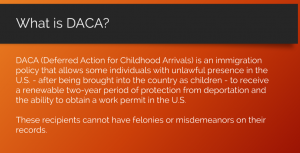From sunrise to sunset every day, a group of activists stand on a set of stepladders outside the Homestead Temporary Shelter to give the children inside the knowledge they are not alone.
The group of activists take turns climbing to see the children above the center’s fence. They shout words of encouragement and comfort while holding up banners to show their unconditional support. “Dile a mi mamá que estoy aquí” (“Tell my mom that I am here”) activist Tina Davidson recounts hearing back from one of the migrant children.
Davidson is part of a national volunteer army, which calls its members “witnesses,” that has been watching over the shelter since early February 2019. The witnesses say they won’t leave until all the children are reunited with their families or placed in foster homes.
“We have seen loads of big white vans with heavily tinted windows that transport the children into the shelter,” said Davidson, who is from Maine. “It’s critical for us to witness what happens in this center because we have entered an era where the government lies to their people and we can’t believe anything they say.”

The U.S. Department of Health and Human Services announced in early April that it would expand the bed capacity at the Homestead Temporary Shelter from 2,350 to 3,200. Currently Homestead shelters children aged from 13 to 17.
According to a fact sheet sent by HHS, the government must provide care for unaccompanied children who are apprehended by immigration authorities while trying to cross the border. The HHS defines “Unaccompanied Alien Children” as those who are younger than 18 and have no parent or legal guardian in the United States available to care for them.
Gale Gordon, a retired doctor from Los Angeles who traveled to volunteer at the Homestead center, said she disagrees with the official definition.
“In many cases, these children are crossing the border with an older sibling, aunts or uncles, or grandparents and the government doesn’t consider them a legal guardian so they are separated at the border,” she said. “The child is placed in a detention center and the family member is arrested.”
HHS didn’t directly confirm that Gordon statement it’s true, however, they stated the following.
Children age 17 and under who are unaccompanied by parents or other legal guardians and who have no lawful immigration status in the United States are apprehended by the U.S. Department of Homeland Security are transferred to the care and custody of the Office of Refugee Resettlement in HHS’ Administration for Children and Families.
The HHS’ Office of Refugee Resettlement states, however, that they operate a network of state-licensed residential centers, not detention centers.
Spokesman Pat Fisher said that due to the crisis on the southern border, the office is facing a dramatic spike in referrals of unaccompanied minors.
“ORR has already received referrals of approximately 32,000 unaccompanied children as of March 30. This is an increase over 2018’s fiscal year of almost 50 percent. Based on the anticipated growth pattern in referrals, HHS is preparing for the need for high bed capacity to continue,” said Fisher.
The ongoing rally in Homestead is not the first time the activist group has protested the government’s treatment of such children. In 2018, a similar center opened in Tornillo, Texas, following a Trump Administration policy – rescinded in June – that separated children from their families that attempted to illegally cross into the country.
Gordon said New Yorker Joshua Ruben was the first member of the group to go to Tornillo. When he found out about the child separation happening at the time, she said he traveled to Tornillo in his RV, and stayed outside the center for almost three months until it closed down in January.
Gordon said Ruben watched buses arrive and depart, full of detained immigrant children. He also created a Facebook group in which volunteers from all over the country signed up to travel to Tornillo.
“When Tornillo closed down and Ruben found out that the Homestead center would not be closing down as well, he relocated to this area and spent 64 days stationed outside until going home for a rest,” said Gordon. “Volunteers come and go, but we always make sure that there are witnesses outside the center keeping a vigilant watch.”
The Facebook group has since been renamed “Witness Tornillo: Target Homestead” and has more than 7,000 members.
Federal officials state that no children had been transferred from Tornillo to Homestead and that the family separation that resulted from the so-called zero-tolerance policy is not driving the continuing operation of Homestead.
But Gordon said that the witnesses will not leave until Homestead center closes down as well.
“These children would be better off in temporary homes,” said Gordon. “There are plenty of homes ready to receive them. It doesn’t matter how accommodating they make the centers, a cage is still a cage.”
Yosleidi Macias, a local witness, said that the boys come out to play around 2 p.m and that the girls are allowed outside around 6 p.m.
“Although [the girls] are rarely seen outside,” she said.
She adds she has other concerns.
“Even though the children have time to play in the prison-like courtyard, we are concerned about how the children are being educated inside the facility,” she said.
The superintendent of Miami-Dade County Public Schools, Alberto Carvalho, has also expressed his concerns about the children and their education.
“It is troubling that so many children are being held apart from any contact with their family members and without access to those daily comforts of home. We should at least provide these children with the dignity of some connection with caring adults and access to educational services,” said Carvalho in a statement sent by the school districts communications department April 16.
For the moment, all the activists can do is wave to the children from the distance and keep advocating for them.































